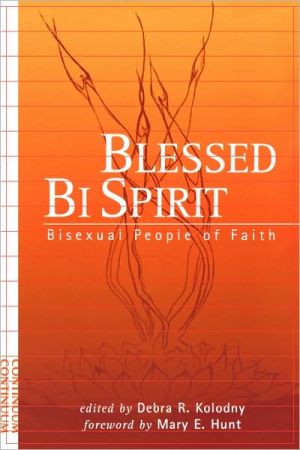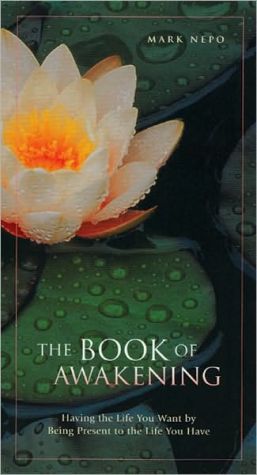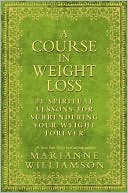Blessed Bi Spirit
Reflecting a wide spectrum of religious tradition and spiritual paths--including Buddhist, Hindu, Pagan, 12-step, Christian and Jewish--over 30 contributors speak about the intersections of their faith practice and their bisexuality.
Search in google:
\ \ \ \ \ Excerpt\ \ \ By Our Lives Be We Spirit:\ Holy Identity\ \ \ \ Sacre Coeur\ Greta Ehrig\ \ \ In the space of two\ lightly touching hands\ \ Rodin saw tenderness, prayer,\ a form of holiness he called\ Cathedral. What is after all\ the architecture of God?\ If our Creator's house is constructed\ cruciform, if Spirit only enters\ the clean, curved coolness\ of mosque or synagogue,\ what about the high-vaulted\ moss-strewn corridor of trees\ \ which leads me\ not into temptation but\ the redemption of river\ and leaves? Hail, my own\ mucky body, regaled\ by the scintillant light.\ \ Tell me.\ Who to love. When.\ I can not hear for the multitude\ singing, and in the vast and intimate\ \ chambers of my heart,\ whether Love comes as a man\ \ or a woman, singular or\ plural, is of no concern\ to the soul flown open\ as a window to God.\ \ \ The Holy Leper\ and the Bisexual Christian\ \ Amanda Udis-Kessler\ \ \ There is no longer Jew or Greek there is no longer slave or free, there is no longer male and female; for allof you are one in Christ Jesus.\ —Galatians 3:28\ If Jesus is holy, then clearly holiness is not about separation.\ —Mike Riddell\ \ \ Jesus' life calls to me in many ways, inviting me to love God, myself, and my neighbors, to trust God utterly and to relinquish my fear, to give myself in service and to strive for a justice that would do justice to God's mercy. Jesus offers me a model of what it means to be a teacher, a healer, a servant, a prophet, a martyr. I could spend the rest of my days trying to learn from him and striving to follow him in the particularities of my own life circumstances.\ One lesson I draw from Jesus' life is that God meets us where we are and welcomes us into abundance. God does not invite us by demanding that we abandon our deepest selves. Instead, the kingdom is offered to us at precisely those most sad and joyous, most broken and healing, most vulnerable places. If I am to take this lesson seriously, I must ask what Jesus has to say to me as a bisexual person, capable of emotionally and sexually loving both women and men, often mistrusted and sometimes rejected by both heterosexuals and lesbian/gay people. If I am to find God in the life of this Rabbi from Nazareth, what word of hope is there that my sexual identity can draw me closer to God, through Jesus, in some way?\ The Gospels, of course, do not record any sayings of Jesus on homosexuality, let alone bisexuality, and it is impossible to know from the available biblical scholarship whether he was attracted to women, men, both or neither (though I would tend to doubt the last possibility). Yet, there is another level of inquiry for me, which draws upon plentiful Gospel material and beyond, into mystery and silence. Jesus was not merely a teacher, preacher, healer, and prophet; he was also, at his core, a shatterer of boundaries, destroyer of margins, and dismantler of statuses in the name of God's boundless, all-inclusive love. It is this facet of Jesus' work that most threatened the authorities of his time and brought him to the cross, and it is in this legacy that I find my own potential for loving beyond at least certain boundaries, welcomed and sanctified.\ Biblical scholar Marcus Borg, among others, has detailed the status-driven politics of holiness and purity which had become manifest among Jews in Jesus' culture. Social inequality in Jesus' time depended on hierarchical dualisms, as do today's commonly recognized forms of social inequality—racism, sexism, class inequality, heterosexism, ageism, ableism, and the like. Hierarchical dualisms are value systems in which two opposite social categories are defined, one of which is valued (white, male, rich, heterosexual, adult, able-bodied) and one of which is devalued (person of color, female, poor, lesbian/gay, very young or very old, disabled).\ Borg's account of the politics of holiness, on which I rely below, has certain limitations which bear mentioning before exploring his explanation of hierarchical dualism. First, it is but one of a number of analyses of this period and has not by any means received scholarly consensus. Second, for the purposes of this essay, I am not focusing on the ways in which Jewish law was frequently grounded in deep concerns for social justice and in caring for the stranger and the poor, for example, the tradition of tikkun olam, the repair of the world. While this tradition may not have received primary attention under the circumstances faced by Jews in that era, it was not absent. In fact, it can be helpful to understand Jesus (as Borg does) not as the founder of a new non-Jewish religion but as the leader of a Jewish revitalization movement attempting to refocus Jews on this very issue. Finally, no account of Jewish life in this period is complete without recalling that the Jews lived under Roman occupation and faced aspects of oppression ranging from unjust taxation and imposition of Roman religious practices to arrest and death for any activity that could be seen as a threat or challenge to the Romans.\ Having thus provided a context for Borg's perspective, let me turn to the core of what Borg calls the politics of holiness: the question of whether a given individual was pure or impure, clean or unclean. Borg claims that the answer to this question meant the difference between social welcome and social disapproval, even ostracism—which, in such an honor-and-shame-based culture, could amount to social death. On the pure/clean/valued side of the equation Borg locates rich (or at least economically solvent) Jewish men in good health and in a position to count themselves among the righteous by following the extensive Jewish laws in their entirety. Among the impure, unclean, and devalued, Borg finds the poor, Gentiles, women, the sick, and those Jews considered sinners for not being able to keep the laws (usually by virtue of being poor, women, sick or some combination of all three). Jesus' frequent references to whores and tax collectors should be understood in this context, argues Borg; whores (unchaperoned women, some of whom were actually prostitutes) and tax collectors (seen as shills for the occupying Roman empire, forced to handle "profane" money, generally trusted about as much as young African-American men are trusted by security guards in stores today) were thought of as among the biggest "sinners" in the purity system. It is not a coincidence that Jesus welcomed them over and over again, told stories in which God's love for them was clear, and told the purveyors of the purity system that tax collectors and prostitutes were getting into the kingdom of God before the so-called righteous.\ Jesus could offer this welcome to outcasts because of his own experience of God's love and welcome, which Jesus translated into a call to be compassionate as God is compassionate (Luke 6:36)—that is, beyond boundaries. He spoke of a gracious Father who sends rain on the just and unjust, urged his followers to love not just neighbor but enemy as well, and instituted a new social structure for eating, a table fellowship in which rich and poor, righteous and sinner, men and women were at the same table in total violation of the purity rules (e.g., Matt. 9:10; Mark 14:3-9; Luke 11:37-38; 14:1; 19:1-10). He treated women, Gentiles, the poor and the sick with dignity and respect (with one interesting exception, Matt. 15:21-28, in which he came around at the end), and he welcomed children, considered nobodies in his culture (e.g., Matt. 18:1-6, 10; 19:13-14; Luke 9:46-48; 10:38-42; 21:1-4; John 4:5-42; 8:1-11). He challenged his culture's hierarchical family structure in ways that would horrify today's "family values" crowd if they paid attention to it (e.g., Matt. 8:21-22; 10:34-37; 12:48-50; 23:9; Luke 11:27-28; 14:26), and he skewered wealth (Matt. 6:19-21, 24; 19:21-24; Luke 4:13-14; 6:20, 24, 30, 34-35; 12:15-21; 14:33; 16:19-25), piety, and prestige (Matt. 6:1-6, 16-18; Mark 9:35; 12:38-39; Luke 14:7-11; 18:10-14) as marks of status. He also engaged in what AIDS activists would call a direct action against Purity Central (the temple, heart of the politics of holiness). Jesus apparently saw God's graciousness as shattering boundaries and understood the appropriate human response as right relationship with God, others, and self, which likewise required boundary shattering. Jesus offered us/called us to liberation from legalisms into love, from class into compassion, from status into solidarity. (My best understanding of the kingdom of God today is that it is simply life in love, compassion, and solidarity with self, others, and the Holy.)\ Perhaps Jesus' most awesome boundary crossing took place in his healing work. Sickness was a mark of uncleanness, and many of the people he healed were doubly unclean, such as Gentiles (Matt. 8:5-13; 15:21-28; Luke 17:1-19), or the woman with a "bleeding problem" (Matt. 9:20-22; Jewish law defined menstrual blood as an unclean substance). Jesus also healed on the Sabbath, breaking the temporal boundary between sacred and profane (Matt. 12:10-13; Luke 13:10-17). While the story about the demoniac in the graveyard (Mark 5:1-17) is probably not historically accurate, it fits what we know of Jesus that he would enter a graveyard (unclean) inhabited by a man with unclean spirits (worse) and send the spirits into a herd of nearby pigs (the most unclean animal, according to Jewish law). Crossing the barriers between healthy and sick people allowed Jesus to offer people with little hope a chance to cross back into the world of the well, but he was only able to do this by himself crossing into the world of the sick and, therefore, the world of the unclean.\ Most of the time, when Jesus healed those with eczema or psoriasis, what is commonly mistranslated today as leprosy, he touched them (e.g., Matt. 8:2-4; Luke 7:22). Touching a leper meant that Jesus took on leprosy himself, both in the sense of risking exposure to the condition, and in the sense of socially becoming a leper for all intents and purposes. Jesus, beloved of God, accepted this "uncleanness" in order to offer healing, and rather than becoming a leper, he sanctified leprosy. Lepers in Jesus' culture lost their status as clean when their condition became public. Yet Jesus appears to have interacted with lepers without losing his "clean" status, perhaps because of his healing ability or the authority with which he taught. At the very least, there is no evidence that he either behaved as an unclean person was supposed to, or that he was treated as unclean by those around him (with one exception, Mark 3:30). Thus, Jesus became what we might call a holy leper or a God-filled outcast; he was somehow simultaneously clean and unclean, an impossibility in the face of the dualism at the heart of the politics of holiness. His impossible status did what no political protest of the time could have done: it collapsed the core of the dualism undergirding the politics of holiness. In other words, by becoming a holy leper, Jesus demolished the categories of "holy" and "leper" as hierarchical opposites, freeing lepers to be holy and enabling those people defined as pure (e.g., the Pharisees) to encounter their own "uncleanness," their full humanity.\ This perspective on uncleanness is, I suspect, a somewhat uncommon way to think about Jesus' gift to humanity. Christians are more likely to focus on Jesus' bridging of the gap between humanity and divinity, to celebrate his conquest of death for all time by the way he died, or to argue (as René Girard did in Violence and the Sacred) that Jesus, in taking on the role of scapegoat, rid the world of its need for scapegoats. However much these characterizations of Jesus' work may speak to me, I am most awed and humbled by his willingness to become unclean and his resulting conquest over uncleanness and the pure/impure dichotomy that has fueled so many hierarchical dualisms. This work of Jesus offers me hope that my bisexuality, far from being a sin, disease, or case of confusion, might be God's way of working gracefully in me against exclusivism and categorization, on behalf of God's joyful and inclusive kingdom.\ Different people, of course, have different gifts, challenges, and life missions, and I don't mean to suggest that being bisexual is in any way better than the alternatives, or that everyone must become bisexual in order for the kingdom to come. That would require a miracle beyond any we see in the scriptures! It does seem to me, though, that Jesus, the holy leper, is well situated to welcome Amanda, the "neither gay nor straight/ both gay and straight," to challenge me and to reassure me.\ Jesus the holy leper speaks to my bisexuality by offering me a model for life outside the boundaries of destructive hierarchical dualisms. Jesus does not appear to have spent much energy worrying about the impossibility of his status, since there was too much kingdom work to do and since his experience was that nothing was impossible with God.\ If I am to follow Jesus in this way, I can and must relinquish my concerns and anger about people who deny the existence of bisexuality. Let them believe what they believe. In the meantime, I'd rather work on bringing the kingdom a little closer than wrangle over the "truth" of my sexual identity. If bisexuality really is a threat to the gay/straight dichotomy, if it challenges people overly invested in the status quo on both sides of the equation, perhaps that's because it is supposed to do so. In the meantime, says Jesus, I'm free to stop worrying about rejection and to offer such healing as is mine to give by crossing boundaries in love. He challenges me to do this work in remembrance of him, and if the boundaries I cross are somewhat different from the boundaries he crossed, so be it (though the people defined as unclean today include sexual minorities of all stripes).\ I suspect that, in addition to my being called to feed the hungry, attend to the sick, visit the prisoner, and house the homeless as much as anyone else on the planet, I'm also called to find ways to use my bisexuality, my form of "holy leprosy," in the service of inclusivity and welcome. I can, for example, strive to make God's love manifest in all of my relationships, sexual and nonsexual, regardless of the genders involved. I can refuse to behave as though men were superior to women (traditional sexist values) or as though women were superior to men (a common response to sexism, but not, I think, the ultimate word about who we can be as human beings). I can offer particular encouragement to others who cross boundaries of gender, sexuality, race, and class, by word and by example, and I can try to be alert to the unique, wonderful, and surprising gifts of individuals without either disregarding or idolizing their gender identities or sexual orientations. These kinds of work are not limited to bisexual people, of course, but my bisexuality can help me carry them out. Undoubtedly, there are more tasks ahead which I cannot envision now, but for which my bisexuality will also be a gift.\ Finally, then, Jesus does offer a word of hope for my sexual identity. Jesus' example, if "translated" as I have tried to do here, reassures me that if I live my bisexuality with such kingdom values as love, compassion, honesty, integrity, and forgiveness, my sexual identity can and will be used in the service of the kingdom and will be part of the solution rather than part of the problem (as the street evangelists would have it). The "symptom of sin and alienation" so derided by biblical literalists can actually be a gift of grace to draw me closer to God the Great Lover, as I seek the kingdom through my bisexuality and offer that bisexuality back to the kingdom again. I pray in Jesus' spirit that this work may give shape to my days, I offer thanks for a God who won't let mere human boundaries stop love, and I praise the Rabbi whose love took him beyond all such boundaries in God's service. Amen.
Acknowledgmentsix Foreword: Conjectures of a Supportive Bi-Stander xi Mary Hunt Introduction1 By Our Lives, Be We Spirit: Holy Identity Sacre Coeur 9 Greta Ehrig The Holy Leper and the Bisexual Christian 11 Amanda Udis-Kessler God Is a Divine Androgen 17 Soror OchO Bi God: Rediscovering an Ancient Self 21 Marcia Deihl Whereto, My Beloved? 33 Ganapati S. Durgadas From Darkness to Gateway: A Journey toward the Light 42 Angel Threatt I Can Love all the Faces of G-d 47 Gilly Rosenthal Look to This Day 53 Lynn Dobbs Is It Too Much To Ask? 65 Rosefire Jesus, Bread, Wine and Roses: A Bisexual Feminist at the Catholic Worker 78 Laurel Dykstra I am Goddess and God, Therefore I am Bi 89 Pashta MaryMoon Communion with Spirit: Wholeness Is Holy Lovemaking 101 Susan Craig Hear, I Pray You, This Dream Which I Have Dreamed 103 Debra Kolodny Merging Candles: From Dualism into All114 Robin Renee From Orientation to Orienteering 118 Ann Schranz Harlot for the Queen of Heaven 124 Sherry Marts Excerpts from Capacity to Enter: A Solo Performance 134 Canyon Sam Aphrodite Urania: Blurring Lines, Crossing Boundaries 144 Raven Kaldera Living in the Margins 151 Danny Klopovic Movie Mecca: Confessions of an Amphibian Life Form 161 Kelly M. Cresap Your Love Amazes Me 174 Diane Pasta A Bisexual Feminist Spirituality 184 Barbara Gibson A Life of Passion and Compassion 192 Valerie Tobin Wrestling with Spirit: Who Defines Holiness? Untitled 197 Susan Craig If You Do Not Tell the Truth, It Will Strangle You 199 Gary Bowen Erotic Spiritualities 203 Loraine Hutchins From Fundamentalism to Freedom 218 Aurora Rose Wolf A Word We Cannot Yet Speak—A Word We Must Now Speak: Bisexuality and the Presbyterian Church (U.S.A.) 226 Susan Halcomb Craig From Minister to Sex Radical: Further (Mis)Adventures of a Lesbian-Identified Bisexual Fag Hag 239 Ellen Terris Brenner The Fear of Growing Things 249 Elizabeth Andrew Full Circle 255 Cheryl Soriano My Proclivities: Buddhism, Bisexuality, Theory, Action 262 P. S. Nellhaus The Goddess Blesses All Forms of Love 269 Starhawk Contributors274








